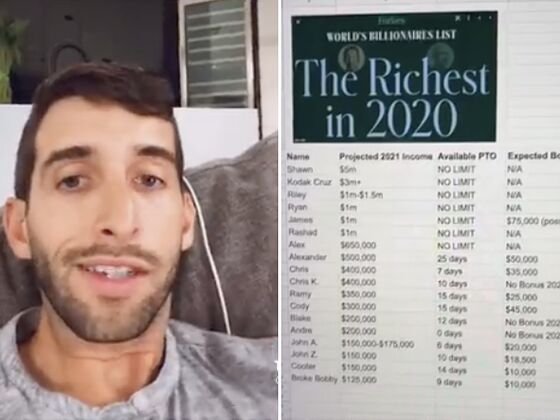For us regular folk, the lifestyles of the wealthy and privileged can be an endless source of fascination, entertainment, and righteous scorn. Take the case of TikToker @tcruznc, who stirred up controversy with a video (which is no longer on his feed but still available reposted on Twitter) in which he reveals how he and his friends plan luxury vacations. In the clip, Cruz shows a spreadsheet that outlines his friend group’s incomes, PTO, and gambling habits. The spreadsheet is titled the “Forbes Friend List.”

This Rich Investor Plans Travel Using a Spreadsheet of His Friends’ Income
Cruz, who bills himself as an “Investor w/ 380+ rental houses,” is unapologetically arrogant and tone-deaf throughout the video, which might be why plenty of people on Twitter found it so offensive. Cruz claims that one friend who makes $125,000 per year is nicknamed “Broke Bob,” and shamelessly reveals one column in the spreadsheet is “3rd world destinations? Yes/No.” He also shows columns for how much people would spend on trips of a certain length. For a seven-day trip, the wealthiest friends were willing to spend $125,000 — the same annual income as “Broke Bob.”
In a subsequent video, Cruz reveals that his lower-income friends — those who make around $60,000 annually — “call themselves” the “Welfare 10,” and their spreadsheet includes a column asking whether or not they’re willing to eat at “non-chain” restaurants. But the “Forbes Friend List” includes members of the friend group who (claim to) make as much as $5 million annually — and asks questions geared more toward luxury travel, like which members of the group would be willing to split a private flight.
What in the wealth is this pic.twitter.com/NTPTKT5CZG
— Karim Alammuri (@Radio_Reem) August 18, 2021
After the original video went viral, Cruz, who first became TikTok famous when he showed he had more than $10 million in liquid assets and paid a portion of some people’s bills, had a little explaining to do. He explained in a follow-up video how his friends made so much money (“Broke Bob” is an accountant, while the highest earners were business owners, money managers, and brokers) and how they planned trips. The goal, Cruz said, is for people in the friend group to plan a trip and know who they could invite based on how much it would cost and how much time people can take off because “This way we don’t hurt any feelings.” As for the third world destinations column, Cruz stated that some people “had bad experiences,” and it’s one of the first criteria they look for. He also clarifies that there’s “no income segregation,” and they “all intermingle” — both those on the “Forbes Friends” list and those on the “Welfare 10.”
It’s not hard to see why flaunting the wealth of his friends so openly — especially in a pandemic-stricken world where so many people lost their incomes, jobs, and family members — could be off-putting. Still, there’s an important lesson here for everyone who plans to take a vacation with friends: It is important to be open about finances before a group getaway.
Cruz calls his spreadsheet “pragmatic,” and honestly, he’s right. Perhaps the most useful aspect of Cruz’s spreadsheet is that there are columns for how much people are willing to spend on three-day and seven-day trips. That’s a great question that more people should be ready to ask their friends non-judgmentally. That level of openness gets expectations out in the open and decreases the chance of stress, conflict, or confusion about expenses later in the trip when you should be enjoying yourself, not worrying over money.
Listen, it makes sense that this style of communication is not suited for every friend group. It does take vulnerability to share your yearly income (which might not even be necessary for the average person who wants to adopt a version of Cruz’s strategy) and travel budget. If you do decide to try out a similar spreadsheet, you should be prepared to accept that some people might not be willing or able to participate in the luxury vacation you had been envisioning. It’s important to take that news without pressuring or shaming anyone.
If you can pull it off, as long as everyone involved is comfortable, it will likely result in a vacation where everyone is on the same page, more relaxed, and less likely to strain friendships if someone feels forced to spend money they don’t have on expensive activities or meals that weren’t discussed beforehand. For instance, at one point, Cruz stipulates that his friend group makes it clear who is willing to gamble on a trip and who isn’t.
The next time you’re planning a group vacation, try outlining the cost of each activity or restaurant you want to visit on the trip and get a sense of who is willing to pay and who would rather not stretch their budget. Consider even offering to pay (if you can afford it) for activities you’re especially excited about or interested in so that everyone can participate.
Vacation should be about bonding with friends and taking your mind off worries, not adding new ones just because it’s a little awkward to talk about money. In fact, your next vacation might just benefit from a frank discussion about money — even if you’re not exactly a member of the tax bracket that can afford a private jet.